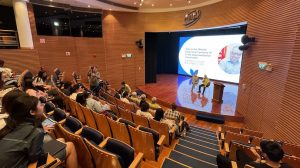Organoleptics deals with the awareness and appreciation of food and drink by the body’s senses. IFTM Assistant Professor Dr. Serene Yan See Wan explains why this is important when ‘engineering’ menus for consumers
Pleasant aromas, good looks, pleasing texture and satisfying taste are basic elements when defining ‘good’ food, because it means food attractive to the human senses. These properties are tied to organoleptics as understood within the field of culinary arts. Dr. Serene Yan See Wan is the IFTM expert on the topic.
Being able to define and order organoleptic properties is an important step in designing a menu and evaluating food to be served to clients in a restaurant setting, says the scholar. “It is related to our five senses, how to use them in evaluating food products.”
Dr. Yan, a Malaysian national, joined IFTM in August last year as an assistant professor. Part of what brought her to the Institute was her expertise in organoleptics.
She holds a PhD in nutritional sciences from the Universiti Putra Malaysia, in Malaysia’s Selangor state. Her research interests include the nutritional and sensory properties of food, as well as consumers’ food choices and types of behaviour displayed when eating.
One of the courses Dr. Yan teaches at IFTM is called ‘Organoleptics: Advanced Menu Engineering’. It is part of the programme for the Master of Philosophy in International Hospitality and Tourism Management. Students on the course are invited to explore how the improvement of organoleptic characteristics of food – taste, colour, aroma, texture, and even sound – can discretely stimulate the sense organs.
As a nutrition expert, the scholar says students enrolled on programmes related to culinary arts must go beyond the senses: they need to have sound nutritional knowledge. She argues that contributes to professionals being able to get a full picture of all the different aspects of the culinary sector’s work.
Dr. Yan explains she sought to join IFTM’s School of Hospitality Management because of the Institute’s high profile locally and regionally, being ranked among the best institutions in Asia – and indeed around the world – for tourism and hospitality education. Prior to that, she had been teaching in Malaysia for more than a decade.
“At IFTM, the administrative staff help us a lot,” Dr. Yan says, giving as an example support provided for the organising of conferences and other events. That allows faculty members to focus on their academic-related tasks, she notes.
The scholar also highlights the trove of resources made available to help with research projects. Some of her latest research work, published earlier this year, has covered topics such as low glycaemic index or low glycaemic load diets for people with overweight or obesity, and consumer acceptance of sodium-reduced condiment from fermented horse gram, a type of bean.









